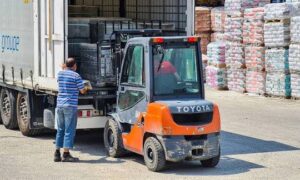Introduction: the unseen heartbeat of freight
Each day thousands of truck drivers thread America’s highways, delivering everything from groceries to heavy machinery. Behind these rigs is a logistical nerve centre run by the truck dispatcher. In 2025 the freight market is unusually dynamic. High fuel costs, driver shortages, new technologies and evolving regulations have made dispatchers indispensable. Without them, freight would slow and carriers would lose revenue. This article explains what a truck dispatcher does, how they differ from brokers, the skills required to succeed and why specialised services like a car hauler dispatch service have become critical. The goal is to give new drivers, owner-operators and fleet managers a clear understanding of this vital role.
What is a truck dispatcher?
A truck dispatcher acts as a communication hub for a carrier. They liaise between shippers, drivers and brokers to keep freight moving efficiently. According to a step-by-step guide for prospective dispatchers, these professionals provide real-time status updates and ensure all parties have the information they need. They plan and optimise routes by analysing traffic, weather and road conditions. Dispatchers also search load boards, negotiate rates, assign freight to drivers and coordinate pick-ups and deliveries. They maintain records and logs, ensure compliance with hours-of-service (HOS) rules and solve unexpected problems such as accidents or delays. Essentially, they are logistical strategists who balance time, cost and compliance to maximise the efficiency of trucking operations.
Dispatchers vs. brokers: understanding the legal distinction
Beginners often confuse a truck dispatcher with a freight broker. A broker arranges transportation on behalf of shippers and must hold federal broker authority. By contrast, dispatchers work exclusively for motor carriers and do not arrange freight for shippers directly. The Federal Motor Carrier Safety Administration (FMCSA) notes that dispatch services typically “work exclusively for motor carriers, not shippers” and perform tasks like sourcing loads and providing administrative support. They are considered bona fide agents when they have a long-term contract with a carrier, comply with state licensing, and avoid soliciting or taking payments from shippers or brokers. Dispatchers require broker authority only if they negotiate directly with shippers, accept compensation from them or allocate loads among multiple carriers. Understanding this distinction protects carriers from unintended legal exposure.
Daily duties and essential skills
The truck dispatcher’s day begins with route planning. They use mapping software, traffic data and weather reports to design the most efficient routes, taking into account drivers’ available hours, fuel stops and delivery deadlines. They assign loads based on truck capacity and driver availability, often using load boards or relationships with freight brokers to find freight. Negotiating rates is another core task; dispatchers balance the carrier’s profit goals with prevailing market rates. Throughout the day they monitor drivers’ progress, update shippers and resolve problems such as mechanical breakdowns or delays. Learn more about what does a truck dispatcher do.
To excel, dispatchers must develop several skills. Communication is paramount: they must relay instructions clearly to drivers and negotiate with brokers. Time management and multitasking are critical because dispatchers juggle route planning, paperwork and emergency response simultaneously. Knowledge of U.S. Department of Transportation (DOT) regulations and HOS rules helps them keep carriers compliant. Technical proficiency with dispatch software, load boards and GPS systems is increasingly important, and stress management allows them to stay calm when issues arise. Many dispatchers start with a high school diploma, but specialized training courses and certifications can improve career prospects.
Technology and emerging trends in 2025
The dispatch profession is changing rapidly. Market research shows that a wave of carrier bankruptcies and exits has reduced competition, making the remaining motor carriers more selective when choosing dispatch partners. Dispatchers must therefore provide added value through technology and niche services. Advanced dispatch platforms leverage artificial intelligence (AI) and data analytics to manage multiple carriers efficiently. iDispatchHub notes that integrating AI and data tools is key to surviving in 2025, as dispatchers face inconsistent broker relationships and increased fraud.
In the auto transport sector, AI-powered navigation systems can optimize route planning, reduce delays and proactively solve problems. Predictive maintenance algorithms use sensor data to identify mechanical issues before they cause breakdowns, improving safety and reducing downtime. Internet of Things (IoT) sensors track speed, temperature and driver rest periods, giving dispatchers and customers real-time visibility. Electric and autonomous trucks are slowly entering the market; while adoption is gradual, these vehicles promise lower emissions and improved safety through AI-driven sensors. Blockchain technology offers secure, transparent transactions and can help verify documents and reduce fraud. For dispatchers, mastering these tools is no longer optional.
Opportunities and challenges
Using a truck dispatching service offers tangible benefits. Dispatchers save carriers time by handling administrative tasks and regulatory compliance, freeing drivers to focus on the road. Well-planned routes reduce deadhead miles and cut fuel costs, boosting profitability. According to the FreightWaves description of dispatching, dispatchers maximize efficiency, reduce downtime and ensure compliance, allowing carriers to stay competitive in a fluctuating market. Small carriers and owner-operators, who may not have dedicated back-office staff, especially benefit from the steady stream of shipments and administrative support dispatchers provide.
However, dispatchers face serious challenges. Freight rates and fuel costs fluctuate, making revenue unpredictable. Dispatchers must adapt to evolving FMCSA rules, such as new definitions of bona fide agents and broker authority. Market volatility and competition from new dispatchers can squeeze margins. The need for advanced technology requires investment and training, and building reliable carrier networks takes time. Fraud and cargo theft are increasing concerns; dispatchers must vet brokers carefully and adopt security technologies. Despite these hurdles, the profession offers a rewarding career with opportunities to specialize.
How to become a truck dispatcher
Starting a career or business as a truck dispatcher or launching a truck dispatching service requires planning. Industry guides suggest registering your business, taking specialized courses and gaining on-the-job experience. Aspiring dispatchers should study transportation management, logistics or business administration to understand freight markets and regulations. Many community colleges and private companies offer dispatch training programs. Certification from recognised associations is optional but may enhance credibility. Hands-on experience is invaluable; new dispatchers often work for established carriers or brokers before opening their own truck dispatching service. Developing communication, negotiation and technical skills will help you stand out.
Special focus: car hauler dispatch service
“A car hauler dispatch service is a specialized form of dispatching that handles the transport of passenger vehicles”, says Lana from Dispatch Republic, the dispatcher from one of renowned USA truck dispatch companies. Auto-transport carriers use unique equipment like multi-level trailers and must comply with regulations on vehicle dimensions and weight. According to an industry Q&A with Montway, specialized routing services consider truck dimensions, weight, fuel consumption and legal restrictions to find safe, efficient routes for car haulers. AI systems optimise routes, reduce mileage and provide real-time tracking. Dispatchers coordinating car haulers must also manage seasonal fluctuations, such as increased demand for used and electric vehicles. They help carriers navigate equipment upgrades and driver shortages by matching loads efficiently and negotiating competitive rates. When drivers are dealing with heavy electric vehicles that require special tie-downs, dispatchers must ensure the right trailer is available and the route avoids weight-restricted roads. Car hauler dispatchers also keep customers informed about pickup appointments, delivery windows and delays, which is critical when transporting high-value vehicles.
Conclusion and call to action
The U.S. freight industry runs on coordination and communication. Truck dispatchers are the unsung heroes who keep goods moving, balancing the demands of carriers, drivers and shippers. In 2025 they must master technology, comply with complex regulations and provide specialized services like car hauler dispatch service. For new drivers and fleet managers, understanding the role of a truck dispatching service is the first step toward building a resilient business. For those considering this career, invest in education, embrace technological tools and hone your negotiation skills. The industry needs competent dispatchers to navigate its challenges. Whether you are an owner-operator seeking support or a beginner contemplating a dispatching career, now is the time to explore how a modern truck dispatching service can help you thrive.



































